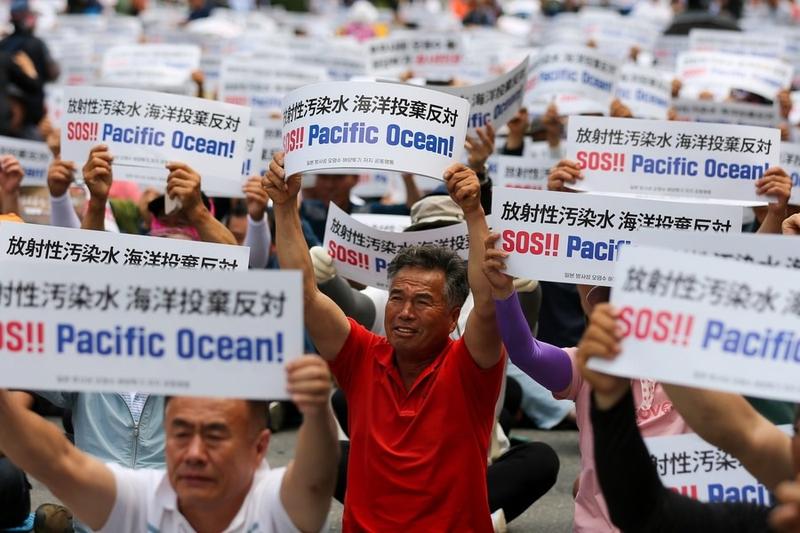 People rally to protest against Japan's planned discharge of nuclear-contaminated water in Seoul, South Korea, June 12, 2023. (PHOTO / XINHUA)
People rally to protest against Japan's planned discharge of nuclear-contaminated water in Seoul, South Korea, June 12, 2023. (PHOTO / XINHUA)
SEOUL - A group of multinational fishermen, experts and activists on Thursday gathered virtually to express their firm protest against Japan's planned discharge of nuclear-contaminated wastewater into the ocean that would destroy the entire marine ecosystem as well as their livelihood.
Haruo Ono, who has been a fisherman for over 55 years in Fukushima prefecture of Japan, told the online gathering that his fellow fishermen in the prefecture were all against the ocean release plan.
"The sea is not only for fisherfolks, but also has many relationships with humans, such as swimming, fishing boats, surfing and sea shrines. Dear everyone around the world, please stop our government's insanity of flushing tritium-contaminated water into the waters of Fukushima because the oceans are connected," the Japanese fisherman said.
Dear everyone around the world, please stop our government's insanity of flushing tritium-contaminated water into the waters of Fukushima because the oceans are connected.
Haruo Ono, Japanese fisherman
Amid wide criticism from both home and abroad, the Japanese government has been pushing to dump the nuclear-contaminated wastewater this summer from the crippled Fukushima Daiichi nuclear power plant, which was hit by a massive earthquake and an ensuing tsunami in March 2011.
"I lived with gratitude (toward the sea) all my life, gazing at the sea all my life, treating it as my life partner like my home, workplace and family and friends.
ALSO READ: Philippine groups step up campaign against Japan's nuke water plan
However, I heard that Japan is going to dump radioactively contaminated water into the sea where I live. It really felt like poison was being sprayed on my body," Kim Young-chul, a fisherman and executive director of the National Fisherfolks Federation in South Korea, said online.
Kim stressed that any country that agreed to pollute the oceans of all humankind would be recorded in history and be forever regretted, calling for fishermen around the world to be united and prevent a single drop of the radioactive wastewater from being dumped into the ocean.
ALSO READ: HK to ban seafood imports if Japan starts dumping nuke water
Dave McCutch, a fisherman in Oregon of the United States who has been fishing since 2002, told the virtual meeting that the US fishermen saw their market "died because everybody was afraid the fish were going to be radioactive."
"Just the public perception of radioactivity in their fish was enough to kill our market for two and a half years. The point is the radioactive water is going to come to the US, American coast. We know that for sure," said McCutch.Mark Barnes, another US fisherman in Oregon who has been fishing for 35 years, said Japan's nuclear-contaminated wastewater discharge would be "super detrimental to the Pacific Ocean," affecting his children and grandchildren as well as himself.
"That's going to take years and years and years to affect. It's going to be a worldwide contaminant that there's no way to clean up after it's done. Absolutely no way to clean it up," said Barnes.
ALSO READ: Reports: Japan to release nuke wastewater as early as late Aug
Experts and activists raised voice against Japan's release plan in violation of international conventions and scientific standards.
Epeli Lesuma, nuclear justice campaigner in the Pacific Network on Globalization (PANG), said that the Pacific Islands were disappointed at Japan's "shameless" disregard of the calls from the Pacific Islands Forum panel of experts to hold off on any release and to explore alternatives.
The release of the nuclear-contaminated wastewater is not a one-off discharge, but rather a program which will have transnational and transgenerational effects. Such a plan will pose enormous danger to the marine environment and lead to the irreversible consequences.
Chen Shi-ting, Senior researcher, Green Citizen Action Alliance (GCAA) from China's Taiwan
Lesuma pointed out that Japan's actions contradicted obligations under the United Nations Convention on the Law of the Sea, violating articles 192 and 195 and nearly all articles in Part 12 which addresses the protection and preservation of the marine environment.
READ MORE: Lee: HK to expand food ban over Japan’s nuclear wastewater release
"The release of the nuclear-contaminated wastewater is not a one-off discharge, but rather a program which will have transnational and transgenerational effects. Such a plan will pose enormous danger to the marine environment and lead to the irreversible consequences," said Chen Shi-ting, senior researcher of the Green Citizen Action Alliance (GCAA) in China's Taiwan.
READ MORE: 'Tightening control over Japanese aquatic products reasonable'
The International Physicians for the Prevention of Nuclear War (IPPNW) said in a statement on May 15 that the plan to use the Pacific Ocean as a radioactive waste dump involved risks to oceanic and human health, urging Tokyo to stop the planned release of large amounts of radioactively contaminated water into the ocean.
The National Association of Marine Laboratories (NAML), an organization of over 100 member laboratories in the United States, said in a position paper in December 2022 that it opposed Japan's discharge plan based on the fact that there was a lack of adequate and accurate scientific data supporting Japan's assertion of safety.


